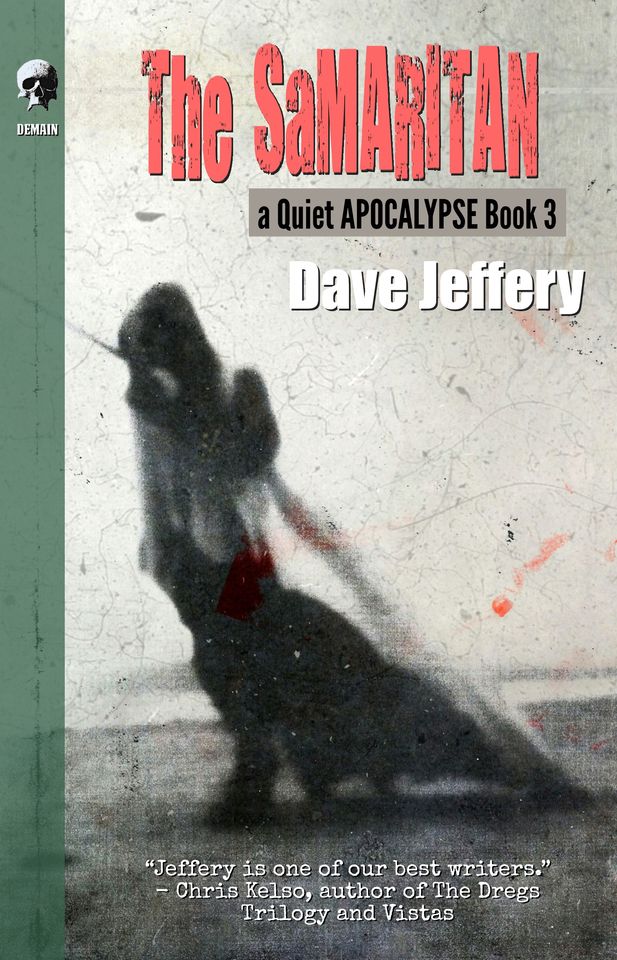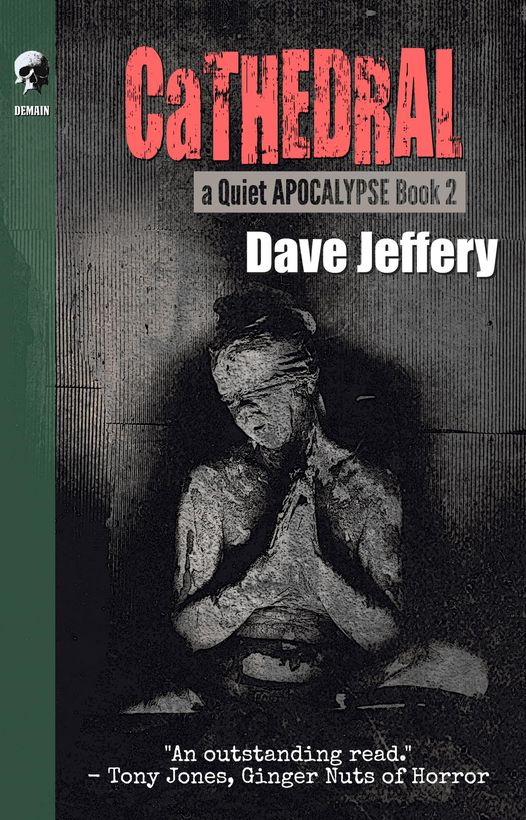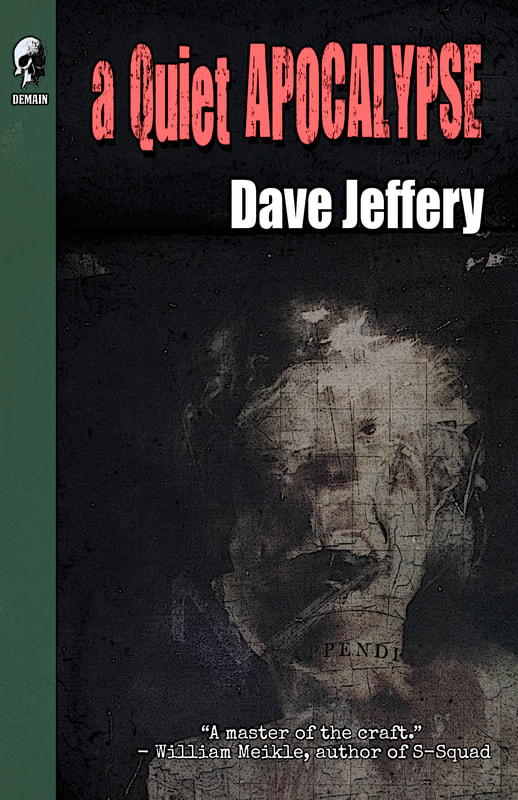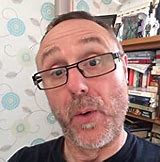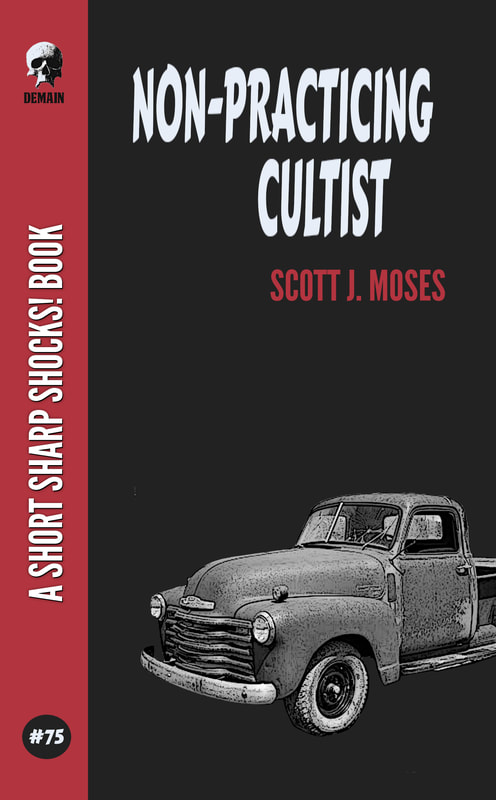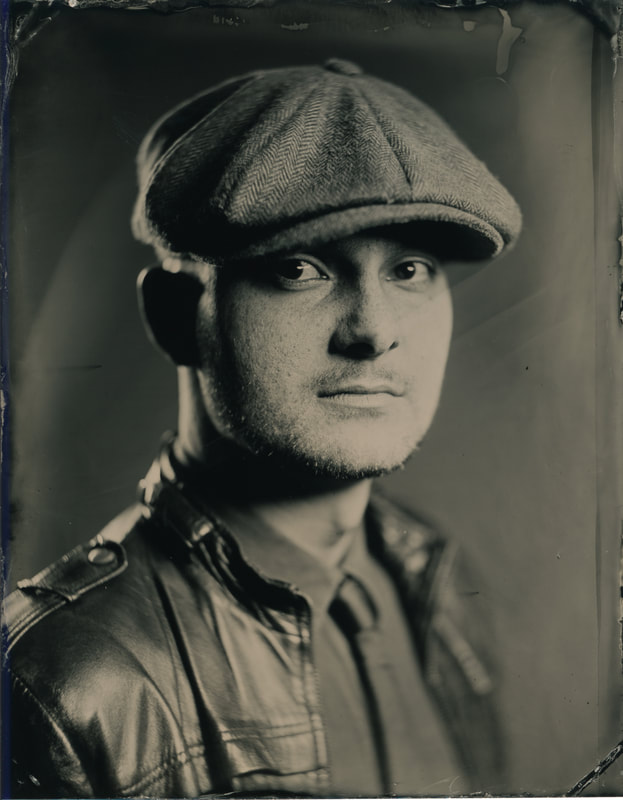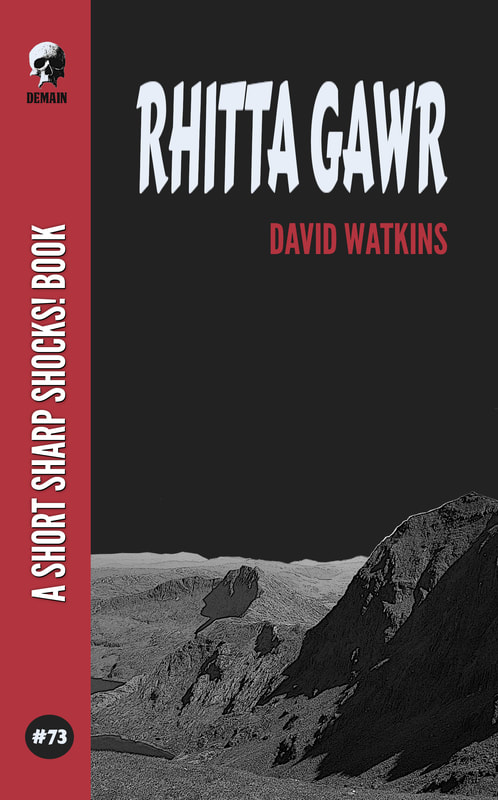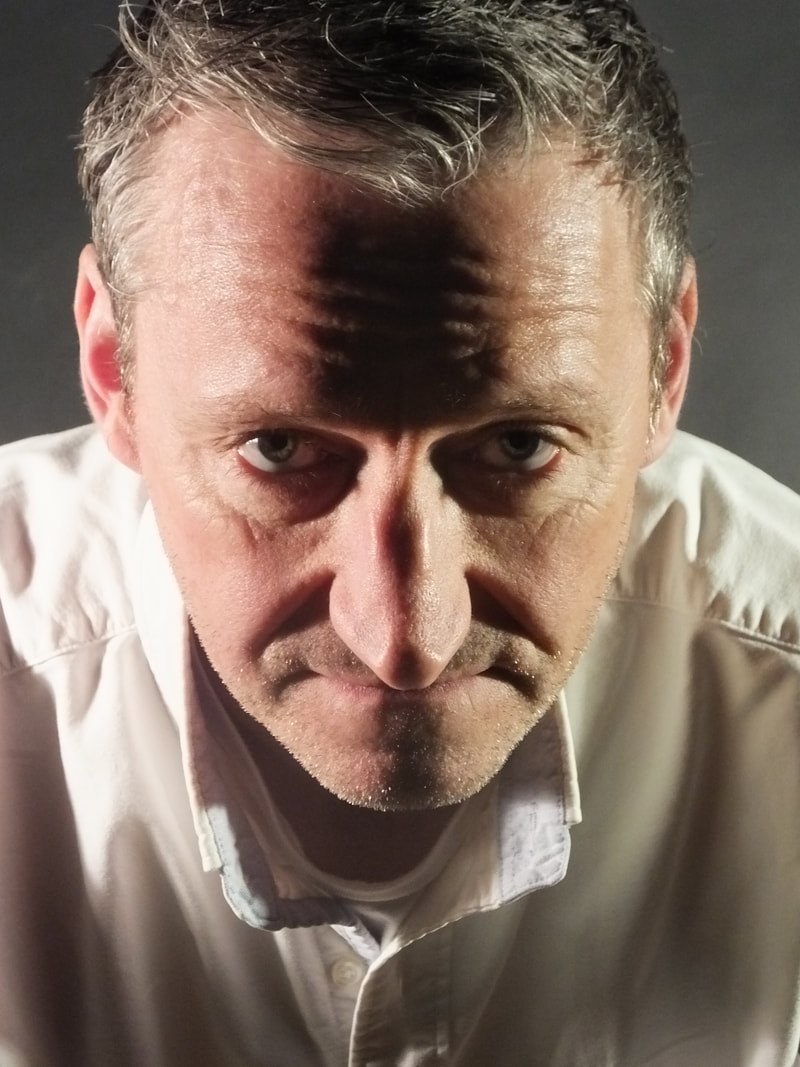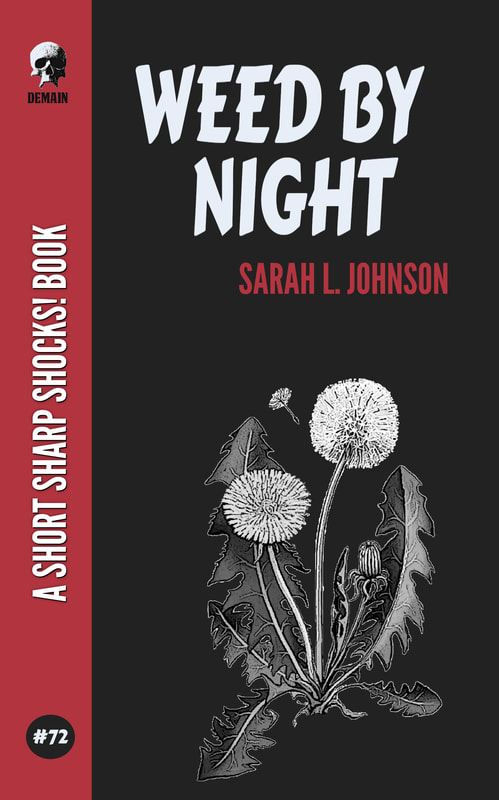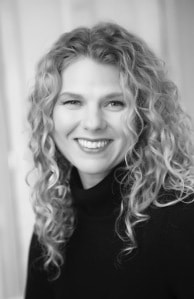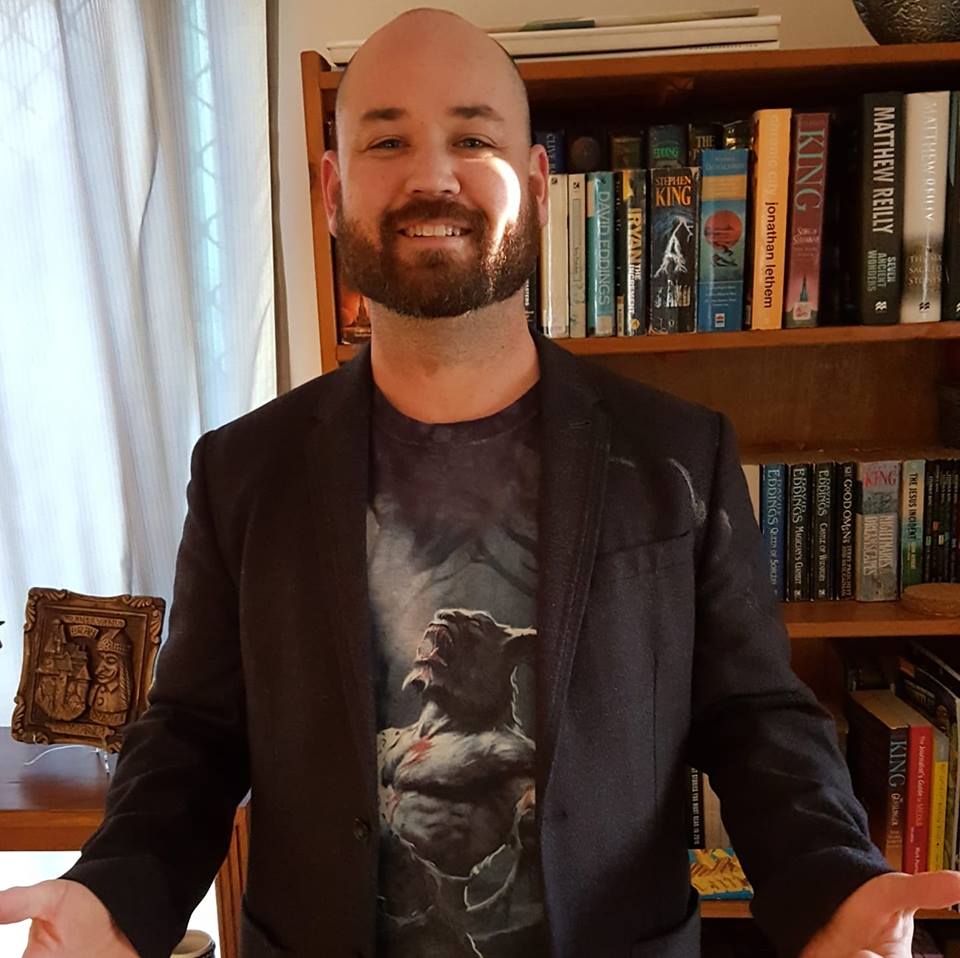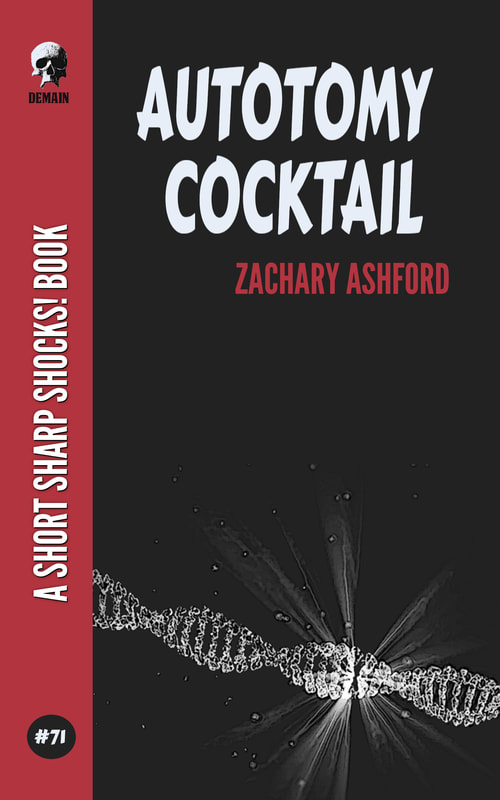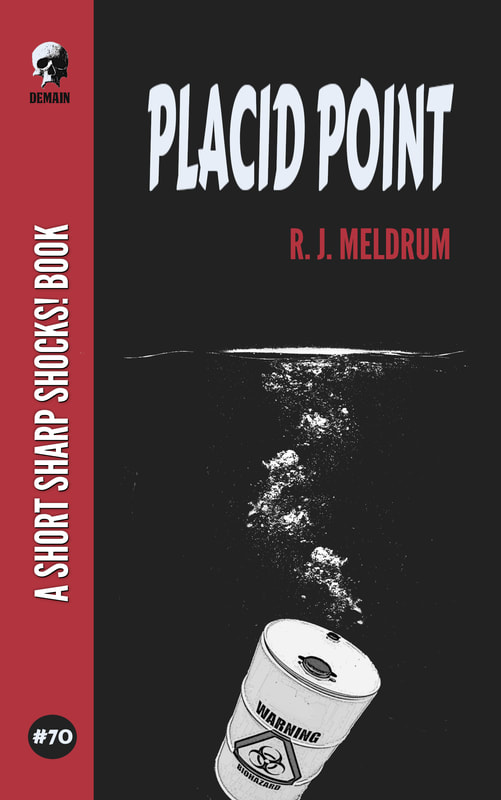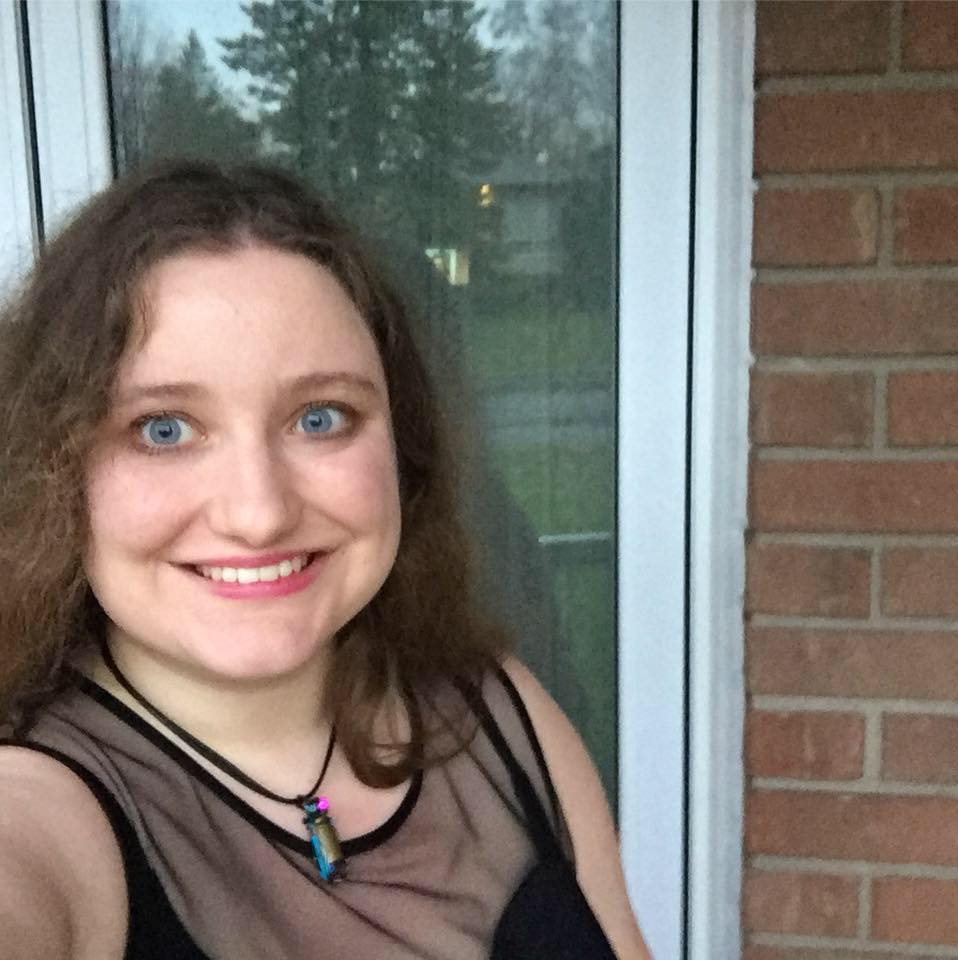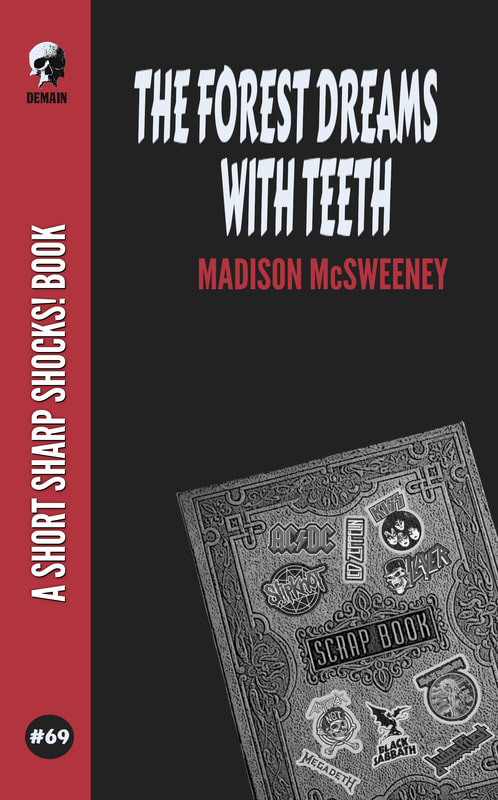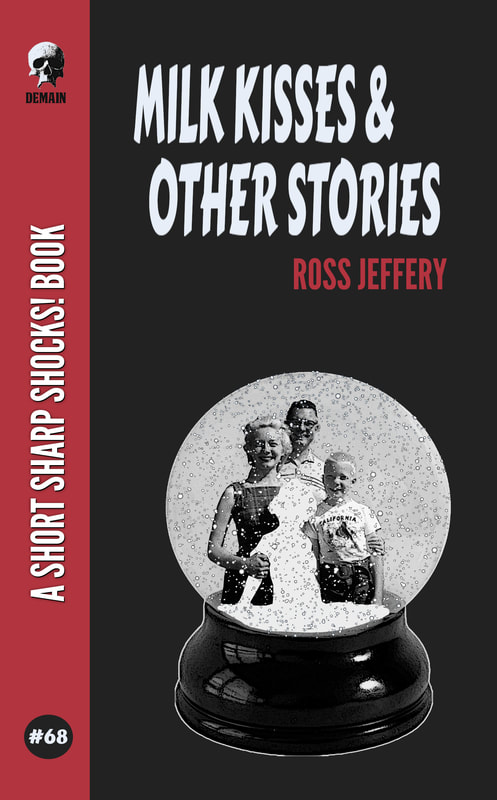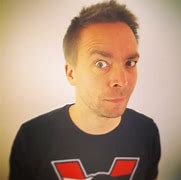|
|
|
The 7th of July sees the publication of THE SaMARITAN, Book 3 in Dave Jeffery’s outstanding series, A Quiet Apocalypse (cover/branding by Adrian Baldwin; central art-piece by Dark Artist Roberto Segate). Dean and Dave sat down recently (social distancing of course) and talked about the new book and the series as a whole.
DEMAIN PUBLISHING: Exciting times right now Dave and congrats for all the amazing reviews you’ve been receiving for Books 1 (A QUIET APOCALYPSE) and 2 (CaTHEDRAL) – thoroughly deserved. So before we talk THE SaMARITAN let’s take a step back for a moment, for those that aren’t yet familiar with your AQA universe could you please give us a quick rundown of where we are so far. DAVE JEFFERY: Hello! Great to be here. And yes, of course. The premise of the A Quiet Apocalypse series is very simple in that a mutant strain of meningitis (known in the series as MNG-U, or Meningitis Unspecified) has destroyed the world and left only a few survivors. Those who contracted the disease have been left deafened and to avoid living in a perpetual state of fear, form a community known as Cathedral, a small commune in the centre of Birmingham, which has strict laws and harsh sanctions, but provides the safety they crave. To compensate for their sensory loss, Samaritans – search teams who go out into the Wilderness beyond the city walls to find resources – track down those who have survived and still retain their hearing. These people – known colloquially as ‘Harks’ – are enslaved and used as commodity. Samaritans also seek out members of the Deaf Community, those people who were born Deaf before MNG-U and unjustly blamed for carrying the disease that wiped out mankind. Scapegoated by the citizens of Cathedral, Deaf people are branded as ‘Harbingers’ and if caught are ritualistically and barbarically executed in an event known as ‘Retribution’. Each story is seen from the perspective of one individual. In A QUIET APOCALYPSE, we learned through the eyes of Chris, an ex-teacher who still has his hearing, what it is like to live as a slave to a deafened master, the atrocity that faces him when he tries to escape and how, in a world so embittered, to find hope. In CaTHEDRAL, we get a perspective from Sarah, a citizen of the community known as Cathedral, and we see how prejudice and blame are fuel for survival in a city where barbarity and civility walk together in the name of keeping everyone safe. Sarah’s story really starts when she falls in love Paul, someone rescued from the Wilderness, and in a commune where long term partners is not in keeping with the law, how she navigates and ultimately challenges old conventions. DP: Thank you…so where does your new book, THE SaMARITAN, fit into this? DJ: One of the joys about writing (and reading) the AQA books is that they all feature different characters and could be happening at any point in time. THE SaMARITAN expands the AQA universe with more details about the way this group functions and their place in the strata of their city. The important thing is how an individual copes when he is cut loose from his unit and must make decisions in isolation as to how to stay safe and, more importantly, stay alive. DP: Tell me a little about your main characters this time around. DJ: Our protagonist is Nathan, the book’s titular character. He is a man caught between two loyalties, that of the city of Cathedral and James, his partner who died of MNG-U. James has left Nathan a code of behaviour that has as its basis a blueprint as to how Nathan may maintain his wellbeing and stay safe. This is in tune with his life within the walls of his city but becomes a major source of conflict when he finds himself injured and isolated in the Wilderness. DP: One thing for me which has been a massive success is that each of the stories has real/fully defined characters which exist totally in their respective universes. Well done. Um, okay so when you wrote the original A QUIET APOCALYPSE did you envisage it would become a trilogy… DJ: Not at all. To be honest, my initial draft was for a commissioned short story for an anthology that never happened. At that point the story was about 8k words and pretty much fleshed out the journey of hearing protagonist Chris and his deafened persecutor Crowley, and Chris’ eventual escape from slavery. This edition didn’t feature the city of Cathedral, nor did it say much about the Samaritans, though they did have a very brief scene. The draft was eventually lost during a Windows 10 upgrade but by this point I was already thinking that it needed to be a longer piece, so this setback just meant I had an opportunity to revisit the story and introduce the concept of the city of Cathedral and give more depth to the Samaritans. It during the second draft phase of book 2 the idea for a third book sparked and started to feel right. I started THE SaMARITAN straight after handing CaTHEDRAL in to my publisher. I was about a third of the way into the first draft when the concept for the fourth [spoiler!!!!] and final installment was fleshed out during a discussion with my son, Tom. As I write this, book 4 is well under way. DP: Really looking forward to that and brilliant news that Tom is involved! The AQA universe is in my opinion a unique one, what made you create it in the first place? DJ: The origins come from my experience of working within the culturally Deaf Community for over 10 years. During that time, I saw the prejudice and ill-informed perceptions of what deafness means to those who are not. To the Deaf Community, deafness is not a disability but the foundations of their cultural identity, with British Sign Language the cornerstone to that culture. The idea of a disease like MNG-U killing most of the world and leaving survivors deafened came in 1999 when I was heavily involved in Deaf Culture. The nuances of the world of AQA would come later, but the basic premise had been percolating for a long time before I committed the first draft to paper. DP: You’ve set the stories local to you… DJ: Yes. They say write about what you know, and this is partly why the setting is primarily in the West Midlands and Worcestershire. But I often find there are scant stories that feature areas where I live and where I grew up. I guess this is my small attempt to address that in some way. DP: And it’s added so much colour to the series as far as I’m concerned. Made them more real and unbelievable. Okay, so [again, spoiler!] you’ve mentioned another book? DJ: Yes. I did. There will be one further book called TRIBUNaL. I have started the first draft and it’s going well. As a world, I find it very easy to write in and it’s easy to get lost in it. There will also be more news announcements relating to the future of the AQA universe as part of this A Quiet Apocalypse Week, hosted by Kendall Reviews [and many thanks to Gavin for giving us his site for a week]. DP: Earlier we talked about the reviews that the first two books have been receiving, which are continuing with those reviewers/bloggers who saw THE SaMARITAN prior to publication. DJ: I’m always stunned by the reader/reviewer response to the series. To be compared to masterworks such as McCarthy’s The Road and Matheson’s I Am Legend is an honour that I do not take lightly. If anything, such accolades only serve my motivation to make the next in the series even stronger than the previous episode. I’m incredibly lucky to have a great publisher [thank you Dave] who understands the series and what it aims to achieve. The content of the AQA universe is grim yet this tone has never been challenged by Dean and the team. This makes for a broad landscape for me to work, without compromising the series. DP: Finally, do you think the AQA universe would work in other mediums? If so – which ones. DJ: I can see the universe working well as a TV series, especially now more of the universe has opened through the release of the other books. Likewise with graphic novels. I understand that audio books may also be in the pipeline, the irony of A Quiet Apocalypse - books about deafness - as an audiobook series isn’t lost on me, but the prospect of such a project is exciting. It is indeed. Thank you so much for your time Dave (and for everything you do for and in the horror community) and the best of luck with THE SaMARITAN – your success is very much deserved. If you would like to connect with Dave direct: Website: https://www.davejefferyauthor.com/ Twitter: https://twitter.com/davebjeffery Instagram: https://www.instagram.com/davejeffery8420/
0 Comments
We welcome American author Scott J. Moses to DEMAIN with Short Sharp Shocks! 75 – Non-Practicing Cultist. The book is published on the 2nd of July with a cover by Adrian Baldwin. It is currently available for pre-sales. For info – we decided with this title to keep the American spelling on the cover and throughout for the ebook. Before publication Dean and Scott sat down and talked.
DEMAIN PUBLISHING: Welcome Scott to DEMAIN. It’s great to have you hear. Can you tell us all a bit about yourself… SCOTT J. MOSES: Thanks, Dean. Well, I’m a Baltimorean writer of dark speculative fiction, primarily short fiction at the moment because I can’t seem to let it alone long enough to tackle something longer haha As to why I became a writer, the answer may be a bit cliché, but I’d always written short stories between classes purely for fun, and it wasn’t until I was around 25 that I decided to make a serious go of it. DP: Ah, I know Baltimore well, well I did twenty odd years ago. I’ll have to get out there again soon as I still have friends in the area. What exactly is your Short Sharp Shocks! about? SJM: Non-Practicing Cultist follows a former Vietnam veteran back from the war who’s taken it upon himself to dismantle the murderous cult he was forced to join as a young orphan. If Judeo-Christian adjacent cults, noir, swamps, and hallucinations are your thing, it might be for you. DP: Oh, it definitely is and I had a great deal of fun reading it – so thanks for that. Did you have to do much research when writing it? SJM: My writing usually has a historical bend to it, so for this story in particular I researched the draft in the ‘60s and ‘70s and that of the Tunnel Rats in the Vietnam war. Men who would volunteer to clear ominous enemy tunnels with nothing more than a flashlight, handgun, and the shirt on their back. DP: At times I’ll be honest I found myself right in those tunnels. I’m not particularly claustrophobic but a few years back I found myself on one of those adventure / team building type of things and one of the ‘attractions’ was this maze of tunnels. I was all gun-ho, went down in the small lift underground, got on my hands and knees and immediately froze. My body wouldn’t move. I managed to crawl back out as I hadn’t gone very far at all and did the ‘walk of shame’ back to the top – never again. Anyway, anyway – creatively what is your biggest success to date? SJM: I guess I’m especially proud of my debut collection, Hunger Pangs, which seems to have been well-received, though if we’re talking professionally or regarding my career, I’d say it was my first professional sale to Cemetery Gates Media late last year for their ‘Paranormal Contacts Anthology’. I’m honored to have been included in that TOC with so many friends and writers I greatly respect. DP: Well done you. Scott, what books/authors do you read and do they influence you? SJM: The authors I find myself returning to again and again are Brian Evenson, Claire North, John Langan, Stephen Graham Jones, Laird Barron, and Han Kang, but there are many others. DP: Some great names there! It’s been a terrible 18months or so for much of the world – would you say the horror genre is affected by world events and have you ever put world events in your work? SJM: I think it was Nina Simone who said “How can you be an artist and not reflect the times?” By default, an artist and the times they live in will seep into their work. If you’re writing honestly, it’s inevitable. DP: I’m with you on that. I’ve written something recently which totally isn’t about covid but when I read it back I realised it was – very odd as that was not my intention at all. “The horror genre is dead.” – Agree/Disagree? SJM: You know, I keep hearing this as well, and would say everything to the contrary. The indie scene is alive and well, that’s for sure. Authors like Hailey Piper, Laurel Hightower, Tyler Jones, and Joanna Koch for example are utterly killing it in the best way, and I’m excited to be in what some have called another golden age of horror. The people who say horror is dead are merely ignorant, in the most respectable form of the word, or just aren’t looking in the right spaces. The indie scene is booming with talent. DP: We know Hailey and Joanna very well at DEMAIN and I wholeheartedly agree with what you’re saying. Creatively is there anything you’d like to do that you haven’t done yet? SJM: Actually, yes, and I’m glad you asked, Dean. I’ve always wanted to try on an editor’s hat for a change, and will be editing my first anthology What One Wouldn’t Do, which is due out in the Fall of this year. The theme is “The Lengths One Might Go To for (fill in the blank here)” and a theme I’m incredibly passionate about. Subs opened/closed in May and I’m excited to read them and everyone’s takes on the theme. Updates can be found on my website: www.scottjmoses.com. DP: Good luck with that. SO, the lockdown – how did you handle it? SJM: It was rough, to say the least, and though I’m a natural introvert, damned if I don’t miss doing things with actual human beings. It did allow for me to ramp up the production of my debut collection, and that’s sort of all I did to keep the isolation beast away. That, and I was fortunate to still have to go into the office as an essential worker, so I was able to get out of the house a fair amount still. It’s a wonder how much the daily commute did for my mental health, though driving through Baltimore was eerie as hell, like a ghost town, really. DP: Yeah, I found the period very creative but it’s definitely affected my mental health so as soon as the restrictions are lifted completely my aim is to get out and about again. Even if it’s just a bus or train somewhere. Okay, last question Scott – can you tell me something your readers might be surprised to find out about you? SJM: Despite being a horror lover most of my life, I’ve barely seen any movies in the genre. For example, I’m 30 years old and just saw Alien, Aliens, and The Thing for the first time a few weeks ago. Before you ask me to return my horror card though, know I’m working through a list to get caught up. DP: That’s very cool – I envy you. Make sure of course that you check out Hellraiser and Hellraiser II – two of my personal favourites! Scott it was great to speak to you. All the best with your SSS! If you would like to connect with Scott J. Moses direct: Website: www.scottjmoses.com Twitter: @ScottJ_Moses Instagram: @ScottJ_Moses On July 2nd we welcome David Watkins to DEMAIN with his Short Sharp Shocks! Rhitta Gawr, number 73 in the series (all with covers / branding by Adrian Baldwin). The book is currently available for pre-sales. A couple of weeks ago Dean and David sat down and talked about it.
DEMAIN PUBLISHING: Welcome David to DEMAIN! Let’s start nice and easy – tell us a little about yourself and your writing. DAVID WATKINS: Hi! Great to be here. For those of you that don’t know me, I’ve David Watkins―Dave to my friends. I’m a maths teacher as my day job, running a team of maths teachers in a small school in North Devon. I’ve written for as long as I can remember and had a five-year plan when I became a teacher: write in the holidays, then give it up and bask in the glory of being an international best seller. I’m still appalled at how naïve (and arrogant) I was. I have been a teacher for 26 years now and have learned to fit my writing in around the day job. I aim for a low word count (500 words per session) so that every time I sit down to write, I hit my target and feel like I’ve made progress. If you go to any writing forum or twitter, there seems to be a lot of competition around word counts and it can be very intimidating. My tip to anyone starting out would be to ignore that and set your own goal. If you are beating yourself up because you didn’t hit 4000 words today, then you’re not giving yourself room to improve as a writer and kind of missing the point. The only thing that counts is ‘bum on seat’ and actually writing. All writers know someone who says ‘I want to be a writer’, but most people don’t put in the time to develop their craft―there’s always something else in the way. Everyone has to find their own way, and mine is slow and steady. DP: Good for you and if it works, why not?! So, your Short Sharp Shocks! DW: A few years ago, my family and a friend’s family climbed Snowdon, in North Wales. Despite being Welsh, I’d never even been to Snowdon. It was a stunning day – proper four seasons type stuff – and when we reached the top, I read about the legend of Rhitta Gawr. He was a giant, supposedly bested by King Arthur, who lived on Snowdon. He likes to collect the beards of his foes as trophies. I thought it would be amusing to send a couple of hipsters with their modern beards up the mountain. Turns out I can’t write comedy, and the story is pretty dark. DP: Yeah, it is pretty dark. So what about research… DW: Well, I climbed Snowdon, which was the inspiration in the first place. Does that count? I spent some time on Welsh legend websites, reading up about the original legends as it was not a story I’d heard previously. I feel like I should hand in my ‘Welsh’ card! DP: Haha – and yes I do think climbing Snowdon counts as research haha. Did you find Rhitta Gawr hard to write? DW: No, but distractions can be a problem. I put my phone on the other side of the room to help me focus, and once I start I find the process straightforward. The first draft was done in a couple of days, hitting a lot more than my usual 500 a day! That’s not to say the first draft was any good, but I’ve learned to enjoy the editing process – that’s how you sculpt those usually rough words into something that actually resembles a story. DP: Exactly – and I know what you mean about distractions they can be very…distracting can’t they? Ha ha. Anyway, creatively what would you say was your biggest success so far? DW: I have three books that I self-published, all have which have sold well and been really well reviewed. It still boggles my mind that people in America, Australia and India have bought my books! However, the thing I am most proud of is my story The Original in the anthology Leaders Of The Pack. It was an invite only anthology, so that’s a first for me and then my story was singled out in many reviews for praise. After a couple of years suffering with a massive loss of confidence (an editor said I wasn’t ready for pro-editing), it was the boost I needed to keep going with my writing. DP: Wow that editor was a bit harsh (and out of order!) but glad you got your mojo back! With everything that’s been going on the last eighteen months or so would you say the horror genre is affected by world events (and would you every write about them?)? DW: I haven’t put the pandemic in anything (yet). I have a feeling we won’t be able to move for lockdown type horror stories over the next few years. I hated lockdown, hated not seeing friends and family, hated the restrictions, but obviously understand the reasons for them. (Don’t panic, I’m no Covid denying moron.) I have no desire to revisit any of that for entertainment purposes. Besides, JR Park’s A Death Dream in Isolation does it all better than I could. DP: I’ll check that out asap – thanks for the recommendation. “The horror genre is dead” – agree / disagree? DW: Absolutely disagree. There are so many great writers working in Horror at the moment, in all its subgenres. I don’t get the ‘horror is dead’ crowd at all. I have a friend who went to the cinema to see A Quiet Place and claimed it wasn’t horror. I’m still confused as to what the hell she thought it was. In terms of books, the variety of horror being produced by writers such as Laura Mauro, Priya Sharma, Dave Jeffery, Alan Baxter, Gabino Iglesias, CC Adams and presses such as The Sinister Horror Company and Horrific Tales (and DEMAIN, obviously!) are churning out consistently good quality work. There are loads of writers I could include here, and I apologise now if I’ve left you off the list. Horror books might not be present in Waterstones and other high street shops, but that doesn’t mean people don’t want to read them. We are a long way from some of the schlocky excess of the 80s. DP: Thanks for the shout out David haha! But you’re right – when I was kid there were so many horror titles in shops but not so much anymore. We’ll have to see what we can do about that. What is David Watkins afraid of? DW: Spiders. Never trust anything with more limbs than you. They feature in The Originals series of mine, and I have to dig deep every time I write a scene with them in. DP: Creatively is there anything you’d like to do that you haven’t done yet? If so – what is it? DW: Does selling film rights count here? I’d love to see The Original’s Return on the screen… Maybe I should write the screenplay myself – what’s the worst that could happen? DP: Exactly – and if you need any help just give me a call – from what you said earlier I think I already know the answer but I’ll ask anyway: writing for you a long term or short term career? DW: Well, I’ve been writing for over thirty years, seriously for nearly ten. Making money would be nice, but having a career would be outstanding. DP: Let’s briefly return to the lockdown (and thinking about your day job in particular), how did you handle it? DW: Contrary to what the media would have you believe, teachers worked throughout lockdown. It was different being home every day, and this last lockdown was definitely harder than the others. Lockdown 2 didn’t really affect me at all – I went to work all day, then came home. It was weird spending your day with 600 kids, but not being able to see your mates at the weekend. That didn’t seem to make much sense to me. Lockdown 3 was full of teaching online all day, which I pretty much hated. Most days you felt like a 3 am radio DJ – is anyone actually listening to me? I was so glad to leave my computer at the end of the working day (again, not 3:30 pm like some would have you believe – it was nearer 6:00 pm) but writing had to take a back seat for the sake of my sanity. My wife and I always went for a long walk with the dog (and sometimes our children!). The fresh air and beautiful countryside around our home (in Devon, UK) really helped keep us sane. DP: And finally then - what is something your readers might be surprised to find out about you? DW: I once got barred from the same nightclub twice in one night! Happens to the best of us! Thanks a million for your time David and the best of luck with your Short Sharp Shocks! If you would like to connect with David direct: Website: www.david-watkins.com Twitter: @joshfishkins Amazon: author.to/DavidWatkins Facebook: @originalsreturn Instagram: david.watkins.writer Short Sharp Shocks! 72 is Weed by Night by Sarah L. Johnson. The book is published on the 2nd July but is currently available for pre-sales. It has a cover by Adrian Baldwin. Prior to publication Dean and Sarah talked about it...
DEMAIN PUBLISHING: Welcome to DEMAIN Sarah! A pleasure to have you here. Can you tell us a little about yourself and why you became a writer? SARAH L. JOHNSON: For the money and fame of course! I figured by now I’d have put a gram of cocaine up my nose and wrapped my Ferrari around a telephone pole. Naturally I’m disappointed in how this has turned out. DP: Haha – I like your honesty. Um, okay, what’s your background. SLJ: I used to be a respiratory therapist, working in acute care and ICU. You see folks at their most vulnerable in those settings. You also see a hell of a lot of funny things. Like a guy walking into the ED (after driving himself there) with a paring knife just sticking out of his head like a weird antenna. Those sorts of experiences and details make it into my work all the time. DP: Wow, that’s...odd but I guess you have to have a sense of humour in those situations. Was that your first introduction into the horror genre? SLJ: No - As a kid I was obsessed with this fairy tale treasury full of gruesome illustrations. Particularly one story about a mouthy young lady who sassed the wrong crone and then every time she opened her mouth, bugs and snakes fell out. Man, I loved that book. DP: My Lord that sounds amazing! What’s your Short Sharp Shocks! About? SLJ: Weed by Night is a story about matrilineal magic and sibling bonds. Kaia and Jack are teenage twins, sent to live on their grandmothers’ farm for the summer. Kaia is used to being the inferior twin. Jack is smarter, bigger, better, at everything. So, when her mom’s moms clearly favour her over her brother, it’s a pleasant surprise. But then Kaia starts dreaming about the garden, and then she starts to worry about Jack. DP: And so she should...in writing Weed did you have to do much research? SLJ: I’m a curious person so I read about all sorts of things all the time just for fun and often end up writing about them later, but generally speaking I hate research and do as little as I can get away with. For this story, I grew up in rural Alberta, so there’s a lot of my lived experience in it. DP: Cool, cool. So, what has been your biggest creative success to date? SLJ: Co-writing Terrace VII: Wall of Fire with my writing partner Robert Bose. A collection of stories based around the theme of lust and Dante’s tower of purgatory. I adore collaborating with other artists and creators, and co-writing these stories was so much fun it’s probably illegal in Kentucky. DP: Haha! What books / authors do you read and do they influence you? SLJ: I love weird books, queer books, books that take big swings at messy ideas and leave a splatter. Hanya Yanagihara, Poppy Z. Brite, Anne Carson, Yoko Ogawa, Megan Abbot, Donna Tartt (holy shit, The Secret History is a scary book). Everything influences me and I hope that never changes. DP: I love Tartt’s work for sure. So what does horror mean to you? SLJ: Horror is an experience, not a genre. For the purposes of marketing, I get it, but I’m a contrary person so I’ll happily run around slandering a lauded work of literature by calling it horror if that’s what I felt when reading it. If you haven’t read Bunny by Mona Awad, please correct that at your earliest convenience. DP: I haven’t so I will. Thanks for the recommendation. What draws readers to the horror genre? What do readers look for? SLJ: That’s such a good question and I often ask it of myself as a writer, reader, and publisher. Good horror doesn’t have to scare to be enjoyable, but good horror will intrude on your sense of safety in some way. Good horror poses questions you may not want the answers to. Good horror puts the bad thoughts in your head. Good horror lingers. DP: It certainly does! Is there a new writer out there that interests you right now? SLJ: Hailey Piper is coming out with some exciting stuff. We published her short story collection Unfortunate Elements of My Anatomy through The Seventh Terrace and it’s just killer. I’m looking forward to reading more of her work in the years to come. DP: Ah yes, we know Hailey well. Great writer. Is there anything you are afraid of? SLJ: My fears would make terrible stories because lists of awkward things I’ve said to strangers are what keep me up at night. My only fear worth writing about is my sleep paralysis demons, and I’m not brave enough yet [to put that in my work]. DP: Creatively is there anything you’d like to do that you haven’t done yet? SLJ: It would be cool to try acting one day. DP: Nice – I would like to try that myself too. There’s been a couple of times I’ve had to stand in on a play I’ve directed/produced when an actor’s been sick etc and I wasn’t a great fan but as I’ve got older I’ve been giving it more and more thought – perhaps I should sign up for some lessons. Is writing for you a long term or short term career? SLJ: Who knows? I plan to make the most of it until I have to fake my death and start a new life in Moldova. DP: Sounds great – the lockdown – how did you handle it? SLJ: I’m an introvert, thus very good at entertaining myself, so it took me a year to get bored. I’ve been running a lot, dabbling in witchcraft, learning how to make cool cocktails, teaching creative writing over Zoom, getting high and losing my socks. I really can’t complain. DP: Oh, I hope you found your socks! Final question then - do you have any funny stories to tell in relation to your writing... SLP: I met George Saunders once. He put his hand on my shoulder for a photo and drew a cute doodle in my battered copy of Tenth of December. I nearly wept. And why not?! Thanks a million for your time Sarah - really enjoyed that. The best of luck with your Short Sharp Shocks! If you would like to connect with Sarah L. Johnson direct: Website: the-seventh-terrace.com Twitter: @leadlinedalias Short Sharp Shocks! 71 is Autotomy Cocktail by previous DEMAIN author Zachary Ashford. The book is published on the 2nd July (available now for pre-sales) with a cover by Adrian Baldwin. Prior to publication Dean and Zach sat down and chatted.
DEMAIN PUBLISHING: Welcome back to DEMAIN Zach – hope you’re doing okay during this very very weird time. Let’s get down to it – can you tell us who you are and why you became a writer. ZACHARY ASHFORD: For me, it was just something I’d always wanted to do, and although I’d done some courses and things, I never really sat down and just did the thing. When I eventually did, I had a story picked up by Dark Moon Digest (which later become the second half of my first Short Sharp Shocks!) and used that as impetus to keep going. I’ve not got a couple of novellas on Unnerving’s Rewind or Die line, a couple of Short Sharp Shocks! and a release coming out through Horrific Tales later this year. I’m thrilled to be writing stories that people seem to dig. DP: I’m really happy you’re building your audience – thoroughly deserved. What was your first introduction to the horror genre? ZA: I think I spoke about this last time, so I’m gonna give some love to my first real look at the Indie Horror scene this time. I was a reader of the Great Jones Street app back when that was live, and I found Max Booth’s story Blood Dust on there. That led me to his website, and a book by Patrick Lacey called Bone Saw. I bought that book and it kicked ass. I didn’t realise people were actually writing fun horror books like that, and BOOM, I was into a whole world of awesome stories. There’s so much cool stuff in the genre that it’s amazing to just immerse yourself in it. DP: 100%! I love horror because it really is a broad church with something for everyone...so, your new Short Sharp Shocks! ZA: Yes, as you know this is my second entry in the series, and although my first is a played straight, this one’s probably more similar in tone to my Sole Survivor novels. It’s very deliberately over-the-top. I wanted a comedic vibe to balance some of the more visceral aspects, and I’d been watching and reading some comedy-horrors and old-school EC comics around the time I was writing it. That’s not to say it doesn’t have nasty aspects; it certainly does, but I also want people to have a bit of a chuckle at this one, and know that it’s a bit ironic. I think I’d gone down a YouTube rabbit hole and was looking at the idea of CRISPR DNA experiments (and the fact they could be done with home kits) and wanted to make a kind of response to that. I hadn’t really done much with body horror before, and I wanted to give that a go. Hopefully, people enjoy it. DP: I’m sure they will. I loved the black humour of it all and really thought it’d make a cracking low budget movie. I said previously that horror was a broad church, what does horror mean to you? ZA: I’ve always loved this question. It’s so different to everyone that it makes for a great discussion point. I’m in the camp that says horror doesn’t have to be ‘scary’ as such. For me, it covers the gamut of things that are deliberately over-the-top and ‘shocking’ in terms of gore, extremity, and bad taste, as well as those things that give you goosebumps (like a well-crafted ghost story). Of course, there’s so much more to it than that. The psychological horror of things that make you uncomfortable or that have the cringe and squirm factor are just as much a part of the horror genre as the traditional ghosts and goblins stuff, and that leads me to my final point – monsters! I love monsters in my horror. DP: I guess you’re frightened of monsters then? ZA: Of sharks I am, yes. I don’t know if I mentioned this in the last interview, but considering they’re just big fish, they scare the crap out of me. I’m so not a fan of swimming in the ocean here in Oz. The place is chockers with them. They haven’t made their way into my work yet, but I think I’ll get there eventually. There’s obviously a lot of fun to have with them. DP: There definitely is. I did write a shark story once for an antho which never happened, it was set off the coast of Australia actually – will have to dust that down someday soon. Um, so creatively is there anything you’d like to do that you haven’t done yet? ZA: I have a background in radio copywriting, so I’d love to write a proper radio play. I’ve done some sequential shorts in the past, but nothing that I could release holus bolus. That would be amazing. DP: I was lucky enough to have a short story broadcast on the BBC earlier in 2021 I’m really liking the medium and would love to do more stuff too – great fun where you can really let your imagination run riot. Writing: long term or short term career? ZA: I’d love for it to be a long-term career, but even if it doesn’t become that, it’s something I’m going to keep doing. It’s very rewarding to see your stuff out there. DP: Exactly, exactly! The lockdown... ZA: We were really lucky here in Australia, and although we’re on the verge of another three-day lockdown tonight, we weren’t locked down for too long. The biggest challenge for me was teaching from home. I bet it was! Mr Ashford, cheers for your time – it was great talking to you again and all the best with your second Short Sharp Shocks! If you would like to connect with Zachary direct: Website: zacharyashford.com Twitter: https://twitter.com/ashford_zachary We welcome back author R.J. Meldrum to DEMAIN with his brand new Short Sharp Shocks! Placid Point (Number 70 in the series). The ebook is out on the 2nd July (though currently available for pre-sales) and has a cover by Adrian Baldwin. Prior to publication Dean and Richard sat down and talked:
DEMAIN PUBLISHING: Great to speak to you again Mr Meldrum – for those that aren’t yet familiar with you or your work can you tell us a little about yourself. R.J. MELDRUM: Hi, of course. I’m British, but currently living in Canada. I work as an academic in a university in Toronto. In terms of writing, prior to 2015 I’d been pottering for years, but never very seriously, or at least with no serious intention to get published. In 2015, I decided to self-publish a collection of short stories and that gave me the confidence to start submitting to publishers. Six years later, I’m nearing 200 stories published (both reprints and originals) and my work has appeared in a number of magazines and anthologies. My first novelette, The Plague, was published by DEMAIN in 2019. DP: Indeed and great fun it was too. So would you say your background has had some influence on you as a writer? RJM: I was born and brought up in Scotland, but have lived in both England and Wales, as well as Canada for the last ten years. That experience of living in different places allows me to write with first-hand knowledge of all these places; allowing me to set my stories both in different parts of the UK and North America. I’m a scientist by training – so I do try to inject logic and science into my stores. John Lansing, one of my few recurring characters, is my ‘go to’ scientist/doctor and I suppose he is partially based on me. DP: Oh nice one, I didn’t know that. I personally think spending time in other countries really does add something to a writer’s armory (so to speak) – what was your first introduction to the horror genre? RJM: I think like most kids growing up in the 70s and 80s, my introduction to the genre came through TV and books. I vividly remember the television adaptation of Stephen King’s Salem’s Lot, which scared the hell out of me. I also remember the Hammer House of Horror television series, which was also pretty scary. I read books by both King and James Herbert and those combined with the television series, got me hooked. DP: I don’t think I’ve seen that version of Salem’s Lot – with David Soul right? – need to check it out. Okay, so your Short Sharp Shocks! RJM: This is my second publication in this series. It’s an eco-horror – nothing supernatural in this story. The ‘villain’ is a bio-engineered micro-organism and it wreaks havoc on a small, lakeside village. It’s a departure from my normal story, but I enjoyed writing it and I hope that readers find it fun to read. DP: I really enjoyed it too so I’m sure your readers will as well. Did you have to do much research when writing it? RJM: I normally don’t do research, but for this story I did. I enlisted the help of a couple of lake ecologists to make sure I got the biology and other scientific aspects correct. For this story, the scientific basis for the story had to be plausible – I hate reading stories where a fact is wrong or the actions of a character aren’t realistic or plausible – it spoils it for me. DP: Me too. With everything going on on the planet right now do you think the genre is affected by world events? RJM: I think horror should reflect both real life and current events – it has to. Horror should reflect humanity, especially the negative parts of society. My stories have used climate change, pandemics (including COVID) and various disasters as backdrops. Without reflecting and commenting on current society, horror is less relevant and less important (in my opinion). Horror has always taken current events or developments and reflected them in a dark way. I think that’s important. DP: Sure and as the world is a scary place right now do you think that the horror genre is dead or at least on its last legs? RJM: No, I don’t think so – at least I hope not! Horror as a genre is very broad and trends do come and go. I can think of a few parts of the horror genre that I don’t read or enjoy, but each to their own! Most people have read a ‘horror’ book in their lifetime, even if they didn’t realise it. I think there is a lot of potential in the genre, as long as it stays current. DP: Final question then: is writing for you a long term or short term career? RJM: I’ve written on and off for most of my life, but I’ve only been published in the last few years. I enjoy writing and that is the main reason for doing it, but it’s also great to see my work in print. I’d love to be able to make my living from writing, but I suspect that will never happen, but plan to always write – well, as long as I keep having ideas! Thank you so much for your time. All the best with Placid Point. If you would like to connect with R.J. Meldrum direct: Twitter: RichardJMeldru1 FB: richard.meldrum.79 Author Interview: Short Sharp Shocks! 69 The Forest Dreams With Teeth by Madison McSweeney6/12/2021 July 2nd sees the publication of Madison McSweeney’s Short Sharp Shocks! The Forest Dreams With Teeth (Book 69 in the series) – currently available for pre-sales with a cover by Adrian Baldwin. Prior to publication Dean and Madison sat down and talked about it.
DEMAIN PUBLISHING: Welcome to DEMAIN Madison, hope you’re doing well…so, let’s talk your background and whether that has had any influence on you as a writer. MADISON MCSWEENEY: Hello! I grew up in the suburbs of Ottawa, Ontario; Ottawa’s the capital city of Canada, so by nature it’s a place where drama and absurdity go hand-in-hand. My family had eclectic interests – my parents were involved in everything from politics to carnivals, so they always knew interesting people and had a lot of wild stories. They were also big movie and music buffs, so I was raised on classic rock and cult movies. I think my fascination with offbeat characters and everyday surrealism comes from that. I found myself drawn to the macabre very early on. I wrote a fairly awful poltergeist novel when I was about eleven, then spent my teen years writing angsty poems and attempting to write angsty dystopian sci-fi novels. Plus lots of pulpy horror stories. I was a student journalist in high school and university, mostly covering the local arts and culture scene, and I learned a lot about the craft of writing through that (I also developed an unhealthy aversion to any paragraph more than three lines long). My first fiction publication was a fantasy detective story called ‘Daydream Noir’ that appeared in the 2015 Fiction Issue of The Fulcrum, the University of Ottawa’s campus paper. DP: Wow, that’s really interesting – your parents sound very interesting people and quite inspiring. What was your first introduction then into the horror genre? MM: I actually can’t remember not being a horror fan. I grew up with the Goosebumps books and cartoons like Tales from the Cryptkeeper, Scooby Doo, and Courage the Cowardly Dog (which is still terrifying even as an adult), as well as urban legend-related shows like Mystery Hunters. I was also really into the Chucky series as an eight-year-old (still am), and my mom got me into Tim Burton at a pretty young age. To be honest, though, it probably all started with The Wizard of Oz. DP: Yeah, that’s bleedin’ scary isn’t it. I’ve always had a soft spot for Chucky too! Okay, so your SSS! MM: ‘The Forest Dreams With Teeth’ begins around a bonfire of heavy metal records and horror movies. A high school student has been mysteriously murdered, and desperate parents are lashing out at the usual scapegoats. When a teenage metalhead gets caught up in the hysteria, he discovers that the town’s madness is being used to feed an ancient evil. Essentially, it’s an occult horror story that subverts the narrative of moral panics. The plot was influenced by folk horror (particularly The Wicker Man and The Ritual) and old-school weird fiction; I was reading a lot of Robert E. Howard at the time and I liked the idea of a suburban outcast as a sword-and-sorcery hero, reluctantly thrust into a world of black magic. DP: Very cool influences there too – so in writing ‘The Forest Dreams With Teeth’ did you have to do much research? MM: Not for this story in particular, but I’ve done a lot of research into moral panics over the years, particularly the so-called “satanic panic” in the 1980s and 1990s. I first became interested in the topic as a high school student, after learning about the PMRC’s campaign to censor any music they deemed “obscene.” Later on, I was haunted by the West Memphis Three and McMartin Preschool cases, particularly the innocent people who lost years of their lives to false accusations. If you study those stories, you’ll find that the real “villains” are often self-proclaimed experts who manipulated vulnerable people into providing false confessions and convinced juries to believe absurd conspiracy theories. That’s why the villain in ‘The Forest Dreams With Teeth’ is a therapist – he’s someone who should know better, but he’s weaponizing hysteria for his own ends. For anyone interested in learning more, I would recommend Sam Dunn’s documentary Metal: A Headbanger’s Journey, Frank Zappa’s The Real Frank Zappa Book, the Paradise Lost and West of Memphis documentaries, Damien Echols’ autobiography Life After Death, and the HBO movie Indictment: The McMartin Trial. DD: I’ll check those documentaries out asap as they sound really interesting. What is Madison McSweeney’s biggest creative success to date? MM: My debut novella is coming out from Filthy Loot in the near future, so that’s exciting. DD: It is! And the best of luck to you. Tell me about your influences. MM: I’m a big fan of Clive Barker, Anne Rice, Ray Bradbury, and Stephen King, as well as older writers like Arthur Machen and H.P. Lovecraft. Outside of the horror genre, I’m really into SFF authors like William Gibson, Michael Moorcock, and the comic book writer Grant Morrison. I also read a lot of poetry. Stylistically, I’ve been highly affected by Ray Bradbury’s poetic use of language. Authors like Neil Gaiman (particularly his and Terry Pratchett’s Good Omens) emboldened me to embrace humour and playful language. Clive Barker’s philosophy – the idea that the unusual is not inherently evil – profoundly influenced my perspective on writing horror, and Stephen King’s reflections on the genre (particularly his non-fiction book Danse Macabre) were also very impactful. In hindsight, I can trace a lot back to YA authors I read when I was younger. The Canadian humour writer Gordon Korman gave me a taste for quirky characters, and Sarah Ellis’s short stories (often assigned in high school English classes) were an early introduction to the subtly surreal, slice-of-life fantasy stories I enjoy. DD: I’ve never really got into Neil Gaiman – I did read American Gods but that’s about it – perhaps when I get five minutes I should give him another try. What does horror mean to you? MM: Horror to me is about celebrating the strange, championing the outsider, and pushing past the bounds of reality. At a very basic level, the appeal of the genre is that it gives us the chance to experience things we might never encounter in real life. I’m drawn to fantasy-horror for that reason: I’m fascinated by bizarre creatures, esoteric cults, and the possibility of alternate worlds. But even the most run-of-the-mill slasher movie accomplishes that goal; I mean, how often do you see someone cut in half with a chainsaw? DD: I like your definition for sure Madison and I’ve started to get into cults a bit – when I was a student my friend and I were ‘tapped up’ by this cult member. He started talking to us on a bus one day and we realised then he was following us and kept turning up at our house and even at our university. He eventually got the message but the whole experience must have lasted six months or so. Very very odd. Anyway – is there an upcoming book / film that you’re particularly looking forward to? MM: I’m really looking forward to Robert Eggers’ The Northman; after The Witch and The Lighthouse, I think we can safely assume it’ll be stunning. And I have a good feeling about the upcoming Texas Chainsaw Massacre sequel. As for books, I hear Brendan Vidito has a novel coming out soon, which I’m excited to read. His short story collection Nightmares in Ecstasy blew my mind - it was like reading Books of Blood or watching Videodrome for the first time again. Of course, I’m also psyched to read whatever Clive Barker comes out with next. Outside the horror genre, I’m looking forward to reading Patricia Lockwood’s new novel No One Is Talking About This; I love her poetry, and her autobiography Priestdaddy is one of my favourites. DD: I remember the first time I read Clive’s [Barker] work and I don’t think I’ve ever felt the same since…is there a new writer (or director) that interests you? MM: A lot of awesome books have come out of the indie horror scene recently! Sam Richard’s Sabbath of the Fox Devils wormed its way into my brain and didn’t leave. Joanna Koch’s The Wingspan of Severed Hands was a thrill. (Frankly, everything Weirdpunk Books publishes has been rad; I have several on my shelf that I’m looking forward to digging into.) Hailey Piper is very versatile and she has a knack for writing settings that come alive; I really dug Benny Rose, The Cannibal King for that reason. I find the bizarro scene very exciting – it’s so diverse and literally anything goes. I had a lot of fun with Danger Slater’s Impossible James last year, and I recently enjoyed Madeleine Swann’s surreal flapper mystery The Vine That Ate the Starlet. I’ll also read literally anything Grady Hendrix writes – he’s brilliant at fusing gimmicky concepts with raw, character-driven horror stories. As for directors, Romola Garai had an incredible debut last year with her gothic/folk horror hybrid Amulet. I hope she does more horror. DD: Ah, we know Joanna and Hailey here at DEMAIN for sure. Last one then, creatively is there anything you’d like to do that you haven’t done yet? If so – what is it? As a politics nerd, I’m a big fan of satirical shows like The Thick of It, Yes Minister!, and the British version of House of Cards; I would love to write something like that. I’ve also got an idea for an offbeat YA story floating around in my head, and I have a set of recurring characters who I plan to build a longer fantasy novel around. Madison! Thanks a million for your time. All the best with your Short Sharp Shocks! If you would like to connect with Madison direct: Website: www.madisonmcsweeney.com Twitter: @MMcSw13 Instagram: madison.mcsweeney13 Facebook: https://www.facebook.com/MMcSw13 We welcome author Ross Jeffery to DEMAIN with his entry to the SHORT SHARP SHOCKS! series (Number 68) Milk Kisses & Other Stories. The book is released on Kindle on the 2nd July 2021 but is available currently for pre-sales.
A couple of weeks prior to publication, Dean and Ross sat down and talked about it. DEMAIN PUBLISHING: Hello Ross! Great to have you as part of the family over here at DEMAIN. For those that don’t know you, can you tell us a little about yourself and Milk Kisses? ROSS JEFFERY: Hi! I’m Ross, I’m the Bram Stoker & Splatterpunk nominated author of Tome, Juniper and Tethered. I live in Bristol but I’m originally from Downham/Bromley (South East London). I’ve always had a passion to tell stories, but always thought that writing was above my reach, that it was something I could only gaze at fondly and dream of one day doing. I’d never been very good at English at school, hated reading out loud in class and I have to say it put me off, I had an awful teacher that used to pick on me. But I eventually went to university to study film and video production and rediscovered my love of telling stories, and started the process of writing, I initially sent out short stories and then one day one got picked up, I had the bug and then things just steadily progressed and now I’ve written three books with a few others on the way. DP: Teachers hey (it’s okay, I’m sure they’re not all bad haha) – I had a similar experience with an art teacher of mine when I was at school where he came up behind me grabbed my brush and snapped it in two saying I had no aptitude for painting. I was only 13 or so. Wow. Anyway, anyway, so your background, can we talk about that and whether that had any influence on you as a writer. RJ: My background is from a working-class family, my dad has always been a person that’s said if you really want something in life you’ve got to go out there and get it yourself, no one is going to give you a hand out. I guess he was right, for me writing has never come easy, it’s a labour of love don’t get me wrong, I love creating stories, I love the process of writing, but it’s the grammatical and spelling side of things that I’ve always struggled with (but I’ve discovered that’s what a good editor is for) – but as with anything if you want to be good at it, you’ve got to keep practicing, keep striving and now, I don’t even think about those hang ups I had about my own self-worth – I just write and take what comes from it, and so far people seem to be really enjoying what I have to offer, it’s a very humbling experience! DP: It is, it is. What was your first introduction to the horror genre? RJ: Stephen King’s IT I had stolen my dad’s hardback copy of it at about age nine – I read it at night when they’d gone to bed, most of it went over my head, but I was smitten with what it had to offer. My dad used to have a big old bookcase in our lounge, full of hardback, all horror, The Exorcist, The Rats, Misery, The Entity, Pet Sematary (pretty much every King hardback at the time) – and for me I’d love just taking those books out and gazing at their covers, and then flicking through the pages. I remember those days fondly. As for horror films – I’d watched Jaws, The Thing and The Exorcist at a very young age and they are still some of my favourite of the genre, but I guess a lot of that has to do with nostalgia and how it felt at the time. DP: Definitely – I love The Entity, one of my favourites! So, the reason we are talking – your Short Sharp Shocks! RJ: Yes. Well, these three stories are a few drippings from my mind, I’ve a huge folder on my computer which is named ‘Beautiful Atrocities’ [great title for a collection by the way – DP] and it’s where I store all my short fiction, some are rough musings, some are short stories I’d like to expand upon and others are just sitting their waiting for a collection to form. But these three stories in particular are varied in their scope of horror and I feel that they each compliment the other and show a broad range of work. What I love about SSS! collections is the scope of each one and when the opportunity arose to put something together these three called out from the drippings and begged me to send them out into the world. DP: We were very happy when we talked about the possibility of you being involved in the SSS! series and we know you really get what it’s all about. What would you say is your biggest success to date Ross? RJ: My novel Tome – it’s up for a Bram Stoker Award for superior achievement in a first novel and it’s also up for a Splatterpunk Award for best novel [well done !!!! – DP]– so that’s just been crazy, never in my wildest dreams did I ever think it would be recognised by two great horror organisations, it’s blown me away and imposter syndrome has definitely kicked in, but I’m just humbled by the whole thing and looking forward to seeing what happens in the coming months! DP: Thoroughly deserved. What books / authors do you read and do they influence you? RJ: I read everything, I don’t just stay in the horror genre – although I do love horror and all it has to offer, sometimes I need a break to preserve my sanity. Everything I read influences me in a way, there is some great work going on in the Indie Horror Scene and some of those voices that have influenced me to date would include people like Gemma Amor, Eric LaRocca, Kev Harrison, TC Parker, Michael Clark, Laurel Hightower, Tracy Fahey and many others. Other authors that I love would include Donald Ray Pollock, Cormac McCarthy, Chuck Palahniuk, Stephen King, Benjamin Myers, Josh Malerman and Hubert Selby Junior. DP: Some cracking authors there and wow, only the only week was I having a discussion about Hubert Selby – glad that somebody else digs his work. What does horror mean to Ross Jeffery? RJ: When I read a horror book I want to be horrified, I don’t want some half assed attempt at a scare I want to be shredded by fear and anxiety – but also I don’t want something to be gratuitous just to offend, it needs to have a good story, great characters and brilliant pacing – their the three things I look for. David Foster Wallace said “Good fiction’s job is to comfort the disturbed and disturb the comfortable.” That’s what I try to do with my horror. DP: I’ll admit I’ve never read Infinite Jest but it’s on my TBR – I really like Wallace’s work though so now you’ve inspired me to read IJ. What draws readers to the horror genre? What do you think readers look for? RJ: I think readers of horror are looking to face their fears, well that’s what I’m looking for, I’m looking to dip my toes into that murky water from the comfort of my chair, to be scared but know I’m safe, I believe from a young age we’re conditioned to be scared of things, why else do we say Boo to babies! DP: Haha indeed, indeed! With everything that’s been going on for the past 18 months or so, would you say the horror genre affected by world events? Do you ever put world events in your work? RJ: I’d say heavily so, but I also believe we should be doing this more – In Tome I’ve used this book as a vehicle to highlight the systemic racism that is still deeply imbedded in our cultures today. Tome is set in Juniper a fictitious town but not far removed from our own, it’s a microclimate of a society, a racist society and I tackled this issue head on – I also go into more detail about the book and the atrocities I’ve tried to shed a light on in the afterword, which I believe makes for good reading and shows the reasoning behind my vision. DP: Is there an upcoming book or film you’re particularly looking forward to? RJ: Josh Malerman’s Goblin which is just out actually and I’m also chomping at the bit for the next Michael Clark book to drop – I’ve beta read this and I can tell you it’s something special. Also I’m very much looking forward to Kev Harrison’s latest offerings that are slowly bubbling away behind the scenes. DP: Ah we know Kev very well here at DEMAIN. What new writer (or director) interests you and why? RJ: Eric LaRocca – man this guy has exploded onto the scene, each of his works are just beautiful, horrific, but beautiful – before reading his work I never realised how beautiful horror could be. He’s one that has a bright future in this writing game, and I for one will be cheering him on all the way – also he has a poetry collection Fanged Dandelion with DEMAIN which I’ve got ready to go! DP: Haha – we love Eric and his collection has gone down a storm. There’s so much love for him in the community – deserves it too. There have been numerous reports recently that the horror genre is dead, what do you think? RJ: As long as there are horrors going on in this world, the horror genre will remain – but it might not look the way we think it should, I’m a strong believer that the work going on in the indie horror scene is much better than at the big publishers – they don’t seem to know how to market horror and I have to say the majority of the books that have scared me this year have all been either self-published or published by indie presses – they’re able to take a chance on an author that a big publisher wouldn’t – that’s why reports suggest the horror genre is dead, because big publishers are just sticking to their guys and girls who they know have sold some books, they don’t want to take the risk on the little guy or girl. It’s a money-making machine that isn’t as invested in the author as they once were, and that’s fine, indie horror is doing pretty well without them. DP: True, true. Is there anything that Ross Jeffery is scared of? RJ: I’m petrified of Spider, any spider, I’ve tried to get better over the years, trying not to put my fear across to my children, but I can’t man… spiders are the devils spawn. And no, I’ve never written about spiders, I probably never will… but never say never! DP: Creatively is there anything you’d like to do that you haven’t done yet? RJ: I’d love to collaborate with an author on a novella or a novel, the process intrigues me and I’d love to give it a go… we shall see, I’ve put some feelers out! DP: Best of luck! Let us know how you get on with that. Final question then Ross: is writing a long term or short term career for you? RJ: To be a career I guess it would need to pay my bills and for me to live a comfortable life, that would be the dream yes! But I’m in for the long haul – I’m using writing as a creative outlet and from early on I’ve always said that I write books for me, I write books that I’d love to read and if people dig that, cool, if they don’t – they don’t. Things are moving in the right direction, I’m happy where things are at the moment, but I’d love to do this as a career, read and write who wouldn’t? EXACTLY! Ross – thanks a million for your time and all the best with your upcoming Short Sharp Shocks! If you would like to connect with Ross directly: Website: https://writerrossjeffery.wordpress.com/about/ Twitter: https://mobile.twitter.com/Ross1982 Other social media: https://rossjeffery.carrd.co |
CategoriesArchives
July 2024
AuthorDean M. Drinkel |
